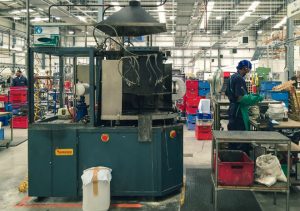 A recent ruling by the U.S. Department of Commerce dramatically increased tariffs on some Chinese steel products, such as cold-rolled steel, which is used to make appliances, cars and electric motors. Tariffs were raised by 500 percent on some other Chinese steel products. President Barack Obama and the major 2016 presidential aspirants, particularly Donald Trump, believe this measure will protect jobs in the U.S. steel industry. There is no doubt that steel industry jobs will be saved. But there is an ignorance and/or incapacity of being able to think beyond stage one when evaluating public policy. Measures to protect steelworker jobs pay attention to only the seen effects of public policy; they ignore the unseen. In other words, they look at only the visible beneficiaries of public policy and ignore the invisible victims.
A recent ruling by the U.S. Department of Commerce dramatically increased tariffs on some Chinese steel products, such as cold-rolled steel, which is used to make appliances, cars and electric motors. Tariffs were raised by 500 percent on some other Chinese steel products. President Barack Obama and the major 2016 presidential aspirants, particularly Donald Trump, believe this measure will protect jobs in the U.S. steel industry. There is no doubt that steel industry jobs will be saved. But there is an ignorance and/or incapacity of being able to think beyond stage one when evaluating public policy. Measures to protect steelworker jobs pay attention to only the seen effects of public policy; they ignore the unseen. In other words, they look at only the visible beneficiaries of public policy and ignore the invisible victims.
U.S. steel companies want to restrict steel imports so that they can sell more steel to American companies and charge them higher prices. That means more employment and greater profits for those in the steel industry. We can think of those observations as the seen, or stage-one, effects of import restrictions.
Daniel R. Pearson has written a Forbes opinion article, which is titled “The U.S. And China Are Both Wrong On Steel” (http://tinyurl.com/h28undm) and gets us beyond stage one. In the May 23 piece, Pearson argues, “The real cost of import restrictions is the harm they do to manufacturers of value-added products that use steel as an input.” Primary metal manufacturing — which includes steel, copper, aluminum, magnesium, etc. — added about $60 billion of value to the economy in 2014. The steel-using manufacturers generated $990 billion of value for the economy; that’s more than 16 times more. Primary metal manufacturing employment was 400,000, while steel-using manufacturers employed 6.5 million people, also 16 times greater.
Politicians have criticized Carrier for its decision to move 2,100 air conditioning jobs from Indiana to Mexico. Carrier is affected by import restrictions on steel, copper tubing and aluminum extrusions and can escape those U.S. government-imposed costs simply by moving production across the border.
Pearson suggests that the United States should send China this message: “Thank you for transferring so much wealth from China to the United States by selling low-priced steel. It’s helping to keep our large manufacturing sector globally competitive.”
Another example of failing to think beyond stage one is with the tariff and quota protections given to the U.S. sugar industry. Chicago used to be America’s candy capital. Today it’s a mere shadow of its former self. Brach’s used to employ about 2,300 people; now most of its jobs are in Mexico. Ferrara Candy Co. has also moved much of its production to Mexico. Wages are indeed lower in Mexico, but wages are not the only factor in candy manufacturers’ flight from America. After all, Life Savers, which for 90 years manufactured in America, moved to Canada, where wages are comparable to ours. By moving to Canada, it became more competitive because it saved itself a whopping $10 million a year in sugar costs.
The question that should be put to those calling for restrictions on imports is: In an effort to save jobs in one industry, do you care about or even know of its cost and disastrous effects in other industries? When Congress enacts a miracle for one group of Americans, such as steel producers, it creates a non-miracle for another group, such as steel-using producers. Should Congress then create a miracle for the steel-using industry to offset the effects of its miracle created for steel producers, such as giving them handouts or their own tariffs? I’m betting that it wouldn’t work. Lawmakers would run into the same problem described in Marcus Cook Connelly’s play “The Green Pastures,” in which God explained to the angel Gabriel, “Every time Ah passes a miracle, Ah has to pass fo’ or five mo’ to ketch up wid it.” Congress should keep in mind God’s further lament — that “even bein’ God ain’t no bed of roses” — and get out of the miracle business.
COPYRIGHT 2016 CREATORS.COM
Photo credit: Alexander Baxevanis (Creative Commons) – Some rights reserved
 Walter E. Williams is a professor of economics at George Mason University.
Walter E. Williams is a professor of economics at George Mason University.
The views expressed in opinion articles are solely those of the author and are not necessarily either shared or endorsed by Black Community News.
 CURE News and Clergy Blog News and Commentary for Christians
CURE News and Clergy Blog News and Commentary for Christians



